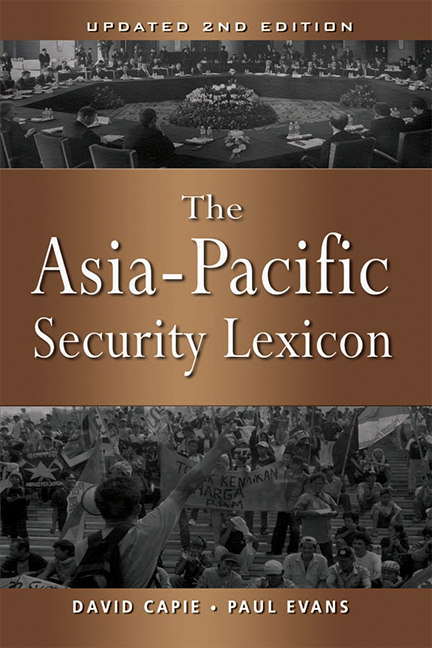Book contents
- Frontmatter
- Contents
- Abbreviations
- Introduction to the Second Edition
- Ad Hoc Multilateralism
- A la Carte Multilateralism
- The “ASEAN Way”
- Balance of Power
- Bilateralism
- Coalition of the Willing
- Coercive Diplomacy
- Collective Defence
- Collective Security
- Common Security
- Comprehensive Security
- Concert of Powers
- Concerted Unilateralism
- Confidence-Building Measures
- Confidence- and Security-Building Measures
- Constructive Intervention
- Cooperative Security
- Engagement
- Flexible Consensus
- Human Security
- Humanitarian Intervention
- Middle Power
- Multilateralism
- Mutual Security
- New Security Approach
- Non-Traditional Security
- Open Regionalism
- Peaceful Rise
- Pre-emption and Preventive War
- Preventive Diplomacy
- Security Community
- Terrorism
- Track One
- Track One-and-a-Half
- Track Two
- Track Three
- Transparency
- Trust-Building Measures
- About the Authors
New Security Approach
Published online by Cambridge University Press: 21 October 2015
- Frontmatter
- Contents
- Abbreviations
- Introduction to the Second Edition
- Ad Hoc Multilateralism
- A la Carte Multilateralism
- The “ASEAN Way”
- Balance of Power
- Bilateralism
- Coalition of the Willing
- Coercive Diplomacy
- Collective Defence
- Collective Security
- Common Security
- Comprehensive Security
- Concert of Powers
- Concerted Unilateralism
- Confidence-Building Measures
- Confidence- and Security-Building Measures
- Constructive Intervention
- Cooperative Security
- Engagement
- Flexible Consensus
- Human Security
- Humanitarian Intervention
- Middle Power
- Multilateralism
- Mutual Security
- New Security Approach
- Non-Traditional Security
- Open Regionalism
- Peaceful Rise
- Pre-emption and Preventive War
- Preventive Diplomacy
- Security Community
- Terrorism
- Track One
- Track One-and-a-Half
- Track Two
- Track Three
- Transparency
- Trust-Building Measures
- About the Authors
Summary
Also known as new security concept, the term is the product of an evolving process of thinking about security concepts in China. The essence of the concept is the idea that security is indivisible and that states must work cooperatively to reduce threats. Specifically, it stresses the need to resolve territorial and border disputes peacefully, to reform international economic and financial institutions to promote common prosperity, cooperate against nontraditional security threats and “conduct effective disarmament and arms control …in line with the principle of justice, comprehensiveness, rationality and balance”. In contrast to China's traditional preference for bilateral ties, when the the new security concept was unveiled in the late 1990s, it suggested a “recently acquired enthusiasm for multilateralism in Asia”.
Prior to January 1997, Chinese officials, academics, and the People's Liberation Army (PLA) representatives used the nomenclature of “mutual security” to describe China's preferred approach to regional security cooperation, offering the 1996 Shanghai Agreement as an example of this concept in practice. Mutual security (see the relevant entry) as it was used then, incorporated many of the same ideas that now appear in the new security approach. But at a meeting with American academics in Beijing in March 1997, PLA representatives referred to the need for “an entirely new concept of security”. According to Ronald Montaperto and Hans Binnendijk, the new concept they outlined was based on three overlapping principles of common, cooperative, and comprehensive security. It rejected bilateral military alliances and emphasized the need for the gradual building of regional consensus through dialogue.
The new concept received the blessing of senior military and political figures and was publicized by Chinese officials in speeches in 1997 and 1998. In December 1997 Qian Qichen explained the concept to an ASEAN meeting in Kuala Lumpur and Defence Minister Chi Haotian also used the term in an address to the Japanese National Institute for Defence Studies in February 1998.
- Type
- Chapter
- Information
- The Asia-Pacific Security Lexicon (Upated 2nd Edition) , pp. 169 - 172Publisher: ISEAS–Yusof Ishak InstitutePrint publication year: 2007



